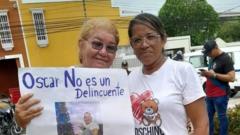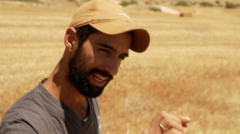Gertrudis Pineda’s anguish over her son Oscar, detained after being deported from the U.S. to a notorious Salvadoran mega-prison, sheds light on the broader issues of human rights and the legality of such actions amidst the ongoing crackdown on gang violence in El Salvador.
Venezuelan Mother Despairs as Son Deported to El Salvador's Mega-Prison

Venezuelan Mother Despairs as Son Deported to El Salvador's Mega-Prison
Gertrudis Pineda fights against the injustice faced by her son, Oscar, among other deported Venezuelans languishing in a maximum-security prison in El Salvador.
Gertrudis Pineda’s heartache is palpable as she speaks of her son Oscar, who recently became one of 238 Venezuelans deported by the U.S. to El Salvador’s maximum-security facility, the Cecot. Crushed by despair, she reflects on how her son, who sought a better life and helped his family from Dallas, Texas, is now trapped in a harrowing situation. “He only went to seek the American Dream and now he's trapped in a nightmare,” she laments, unable to get information about his wellbeing.
Separated by six borders, Gertrudis lives in Venezuela’s Zulia state while Oscar now faces accusations, from the U.S. government, of being linked to the Tren de Aragua gang. The deportation sparked controversy, as officials utilized the 1798 Alien Enemies Act, sidelining a federal judge's intervention that ordered the migrants' return. Upon arrival in El Salvador, images of the deportees with shaved heads appeared on television, deepening the sense of their mistreatment.
Activists, along with Gertrudis, demand accountability, highlighting that many of those detained may not have any criminal records. While the U.S. administration claims a thorough vetting process before deportation, assessments by Salvadoran legal experts suggest that a significant number of those deported are innocent. “They didn’t do anything wrong but they’re treating them like animals. Where are their human rights?” questions Gertrudis.
Conditions within the Cecot itself have drawn criticism. Human rights activists depict it as a "black hole" where rights are methodically disregarded. Reports indicate that inmates are denied basic sunlight and humane treatment. Political responses to the situation remain split, with El Salvador's President Nayib Bukele staunchly defending the facility and its purpose in combating rampant gang violence.
Amid growing concerns, Venezuelan Vice-President Delcy Rodríguez has expressed her commitment to seeking the deportees’ freedom. Legal expert Jaime Ortega is tasked with navigating the complex bureaucracy in hopes of resolving the situation, although there seems to be no legal framework allowing the U.S. to facilitate such deportations.
Bukele’s hardline approach has yielded general public support in El Salvador, with citizens favoring the increased security measures. However, concerns linger about the fairness of the actions taken against alleged gang members, especially as innocent individuals caught in the crossfire suffer in the process. The narrative in formerly gang-dominated neighborhoods displays stark contrasts of violence replaced by tranquility, yet whispers of injustice still persist.
As Gertrudis navigates the pain of uncertainty concerning Oscar, she stands as a voice among many, seeking justice not only for her son but for all whose lives have been affected by these sweeping deportations. “They must send them home,” she insists fervently, urging for the return of her son and the recognition of their human rights.






















